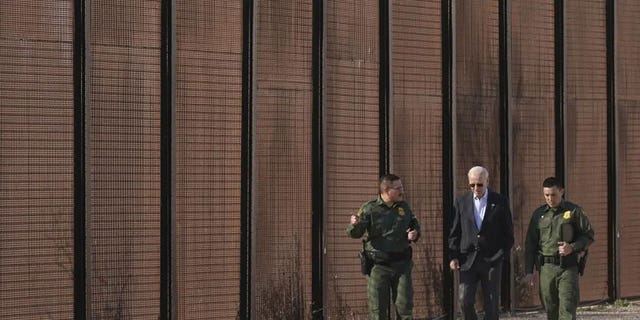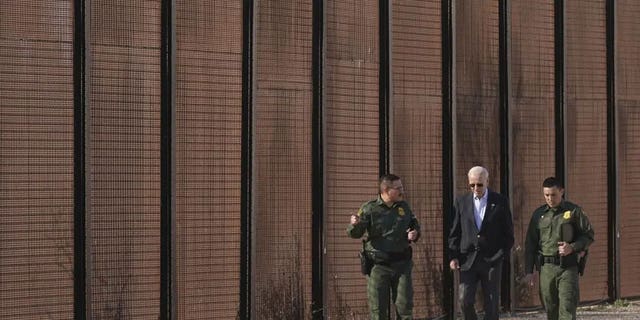
Customs and Border Protection (CBP) officials are warning migrants who are thinking of entering the U.S. illegally that the southern border is “not open” — ahead of the end of the Title 42 expulsion authority next month.
“The U.S. Border Patrol in El Paso Sector would like to remind migrants that the border is not open for those without authorization or a legal basis to enter,” CBP officials in El Paso said via a statement on Thursday.
Officials have regularly issued warnings in both Spanish and English to combat what they see as misinformation being spread by smugglers and transnational criminal organizations that the border is open.
In the U.S., the debate over the ongoing crisis at the southern border has been fierce. Republicans have accused the administration of adopting “open border” policies that have fueled the crisis — which saw more than 2.3 million migrant encounters in FY 2022 alone. They have pointed to the halting of border wall construction, the ending of Migrant Protection Protocols (MPP) and the paroling in of migrants as examples of policies that have encouraged migrants.
HOUSE REPUBLICANS WANT ANSWERS FROM MAYORKAS ON ‘ABUSE OF PAROLE’ AT THE BORDER AFTER FIERY HEARINGS

President Joe Biden walks with U.S. Border Patrol agents along a stretch of the U.S.-Mexico border in El Paso Texas, Sunday, Jan. 8, 2023. (AP Photo/Andrew Harnik)
Recently a Florida judge shut down the Biden administration’s paroling in on migrants with Alternatives to Detention and accused the administration of having “turned the Southwest Border into a meaningless line in the sand and little more than a speedbump for aliens flooding into the country.”
The administration says it is restoring legal asylum pathways destroyed by the prior administration while tackling a historic hemisphere-wide challenge. It has also pointed to recent measures introduced in January, including an expansion of expulsions to four countries — Cuba, Venezuela, Nicaragua and Haiti — along with a humanitarian parole program to allow up to 30,000 migrants from those nations to fly into the U.S. each month. It says those policies have been followed by a sharp drop in encounters at the border.
However, Title 42 is scheduled to end next month on May 11 along with the COVID-19 public health emergency. The order was introduced at the beginning of the pandemic and allows for the rapid expulsion of migrants at the border. Its ending has raised concerns that there will be a fresh surge of migrants at the border who believe they are more likely to be able to be released into the U.S. instead of returned. When the order was set to end at the end of 2022, officials warned of up to 14,000 migrant encounters a day.
FEDERAL JUDGE RULES BIDEN BORDER POLICY UNLAWFUL, A ‘SPEEDBUMP’ FOR ILLEGAL MIGRANTS
The CBP officials, however, sought to emphasize that removals and other enforcement under the regular Title 8 authorities will still be in place. DHS has separately stated that it has a plan in place to deal with any surge, and will also be introducing an asylum ineligibility for those who cross illegally and have not claimed asylum in a prior country through which they traveled.
“The El Paso Sector is currently working with other sectors to assist with the expulsion of migrants encountered in the El Paso Region. Those migrants that are not amenable to expulsion and do not have a legal basis to remain in the U.S. will be placed in removal proceedings under Title 8. THIS HAS NOT CHANGED,” the statement said.
“We would like to emphasize that migrants encountered in the El Paso Sector are also currently being expelled through ports of entry throughout the southwest border,” the statement added.
Border policy was under heavy scrutiny last month when Homeland Security Secretary Alejandro Mayorkas appeared before Senate and House committees and defended his agency’s handling of the crisis in the face of fierce Republican criticism.
CLICK HERE TO GET THE FOX NEWS APP
Some Republicans have raised the possibility of impeaching Mayorkas for his handling of the crisis, with some lawmakers in the House already introducing impeachment articles against the DHS chief.
Those hearings came after Border Patrol Chief Raul Ortiz had testified to a House hearing that agents did not have “operational control” of the border and that there were multiple sectors facing a “crisis” situation.








